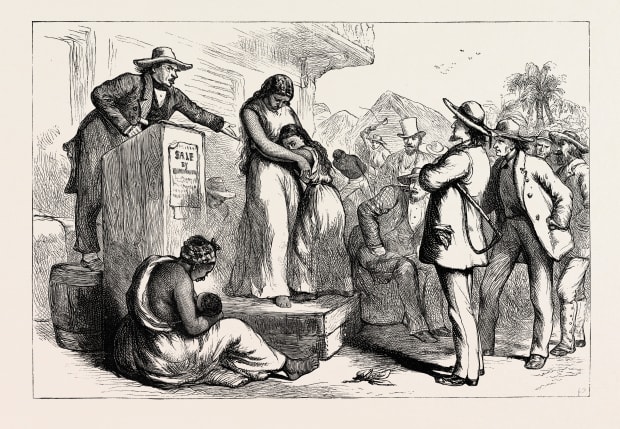But the argument that Washington and Jefferson were mere products of their time may ring hollow for some— their contemporary John Adams, who served as the nation's second President, didn't own slaves. He also declined to use slave labor on principle, although he spoke out against a bill to emancipate slaves in Massachusetts in 1777, saying the matter was too divisive at the time.
但是認為華盛頓和杰斐遜只是那個時代的產(chǎn)物的說法,可能聽起來有些空洞——和他們處于同一時代的約翰·亞當斯是美國的第二任總統(tǒng),他沒有奴隸。他堅持自己的原則,拒絕使用奴隸。盡管他公開反對1777年在馬薩諸塞州解放奴隸的法案,他認為在當時這個問題太容易造成分裂了。
And while contemporaries such as British politician William Wilberforce led the abolitionist movement to end slavery, Washington and Jefferson continued to profit off slave labor while decrying slavery as abhorrent.
當諸如英國政治學家威廉·威伯福斯等同時代的人們領(lǐng)導廢奴運動以結(jié)束奴隸制時,華盛頓和杰斐遜一邊繼續(xù)從奴隸勞動中獲利,一邊譴責奴隸制是可憎的。
In an article for Smithsonian magazine in 2002, the late historian Stephen E. Ambrose laid bare the contradictions in both Washington and Jefferson's lives.
在2002年史密森尼雜志的一篇文章中,已故歷史學家斯蒂芬·安布羅斯揭露了華盛頓和杰斐遜生活中的矛盾。
Both were visionaries who championed liberty, but "failed to rise above their time and place" when it came to slavery, Ambrose wrote. But he insisted that they should not be disavowed and judged solely on that.
安布羅斯寫道,這兩個人都是有遠見的人,他們擁護自由,但在奴隸制問題上“未能超越他們所屬的時代和地點”。但他堅持認為,不應僅憑這一點來否定和評判它們。

"The Washington Monument and the Jefferson and Lincoln memorials remind us that greatness comes in different forms and at a price. Jefferson, by his words, gave us aspirations. Washington, through his actions, showed us what was possible. Lincoln's courage turned both into reality," he wrote.
“華盛頓紀念碑以及杰斐遜和林肯紀念館提醒著我們,偉大是以不同的形式和代價來實現(xiàn)的。杰斐遜用話語給了我們希望。華盛頓用行動向我們展示什么是可能的。林肯的勇氣把這兩件事都變成了現(xiàn)實,”他寫道。
"Slavery and discrimination cloud our minds in the most extraordinary ways, including a blanket judgment today against American slave owners in the 18th and 19th centuries," he said. "That the masters should be judged as lacking in the scope of their minds and hearts is fair, indeed must be insisted upon, but that doesn't mean we should judge the whole of them only by this part."
“奴隸制和歧視以最意想不到的方式迷惑了我們的思想,包括今天對18世紀和19世紀美國奴隸主的全面判決,”他說。“認為這些奴隸主們思想狹隘,內(nèi)心局限,這樣的判斷是公平的,也是我們必須真正堅持認為的,但這并不意味著我們只通過這一部分就去判斷他們的全部。”
Ellis noted that many historical figures including the Founding Fathers wouldn't come off well when judged by modern standards. "If you do that, there won't be anybody left," he said.
埃利斯指出,如果我們以現(xiàn)代的標準來衡量開國元勛等許多歷史人物,他們并沒有表現(xiàn)得很好。“如果你這樣做的話,就不會有人留下來了,”他說。
America has been a nation of paradoxes from its inception, he said. "America is set on a group of ideals that are quite oppressive," he said. "The society that saved the West and Western Civilization in the 1940s and against the Russians in the Cold War is the same society that's responsible for Indian removal and black slavery."
美國從一開始就是一個充滿矛盾的國家,他說。“美國是建立在很多非常壓抑的理想之上的,”他說。“美國社會在20世紀40年代挽救了西方和西方文明,并在冷戰(zhàn)中對抗俄羅斯,但這個社會也同樣要對印第安人遷移和黑奴制負責。”
But while he understands why some protesters are yearning for contentious monuments to be torn down, Ellis doesn't believe it will help end racism in the country.
但是盡管埃利斯理解為什么一些抗議者渴望拆除有爭議的紀念碑,但他不認為這樣的行為會有助于結(jié)束美國的種族歧視。
"Anybody in America who believes racism is going away, that we can expunge it by knocking down monuments, is naive. It's a cancer. It's never going away. Never," he said. "We can take steps forward, but everybody time you do, there is a permanent pool of racism beneath American society."
“在美國,任何一個相信種族主義正在消失,我們可以通過拆除紀念碑來消除種族主義的人,都太天真了。這是一種癌癥。永遠不會消失。永遠不會,”他說。“我們可以向前邁出一步,但每一個人只要你這樣做,就永遠會有一個種族主義群體存在于美國社會。”
"The ideals are there, we've acted on them in many ways, ending slavery was one step, the Civil Rights movement was another step. But each step in American history forward produces a half-step backward. For every 10 Americans that thought Martin Luther King had a dream, there's another three that thought it was a nightmare."
“理想就在那里,我們已經(jīng)在很多方面采取了行動,結(jié)束奴隸制是一步,民權(quán)運動是另一步。但美國歷史上每向前走一步,就會倒退半步。每10個認為馬丁·路德·金有夢想的美國人中,就有3個認為這是一場噩夢。”
譯文由可可原創(chuàng),僅供學習交流使用,未經(jīng)許可請勿轉(zhuǎn)載。












